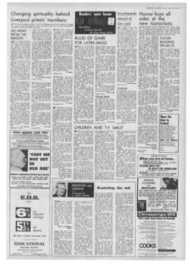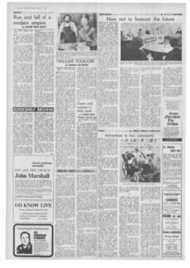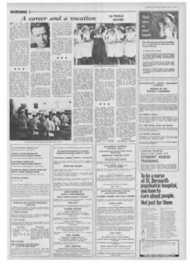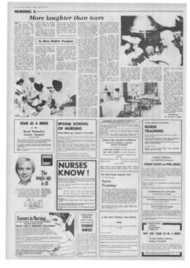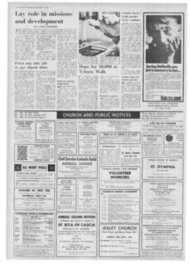Page 7, 24th April 1970
Page 7

Report an error
Noticed an error on this page?If you've noticed an error in this article please click here to report it.
Tags
Share
Related articles
A Vocation And A Sense Of Real Satisfaction
Choice Of Careers
Careers Guide To Hospital Service
Thank You Nurse
Nursing A Profession Based On Vocation
A career and a vocation
by PAULA DAVIES
ONE in three student nurses in Britain gave up their profession before completing their training. The reasons include marriage, fa ilu re of examinations and the realisation by some girls that the "Lady with the lamp" image is no longer up to date.
All this is fair enough but for the fact that about 50 per cent of nurses leave the profession after qualifying. Although Dr. John Dunwoody, Joint Parliamentary Secretary at the Department of Health and Social Security, reasons that many of them leave for a few years to return later, the problem was regarded seriously enough to warrant two reports, the Platt Report in 1964 on nursing education and training and the 1966 Salmon Report on senior nursing staff structures.
Both reports coupled the low pay factor with the need fot administrative re-organisation and the revision of training schemes as the main causes of discontent among nurses. Less obvious, perhaps, but even more often complained of are the petty disciplines and general lack of regard for a nurse's happiness. She can find herself being treated like a backward child in the nurses' home and then on the wards find herself entrusted with decisions of life and death. It looks as though the pay problem is being dealt with realistically. Under the latest rises. first year student nurses will receive £525 a year instead of £443, the staff nurse will be ' on a scale of £930 to £1,182 and the ward sister should find things easier on a salary scale ranging from £1,200 to £1,554 instead of the old scale starting at £970 and rising to only ,315.
The nurses are justifiably pleased with the way things are going, although pay, as one young nurse remarked, is not everything. "Let them treat us as adults with personal lives that are important to us and hospitals will be flooded with nurses."
Dr. Dunwoody, who as a medical doctor knows more about the problems than the average politician, agrees with this view. "Obviously the problem of recruiting and keeping good nurses is not simply a question of pay. The fact that they have received a significant increase, however, is a measure of the importance of the nurse She belongs to an exceptional group of people who should receive exceptional treatment," he said.
There were some pretty "exceptional" demonstrations, too, if I remember, by Sister Patricia Veal and her followers who caused the more than usually staid Royal College of Nursing to set up a Raise the Roof Campaign in October last year. But, as Dr. Dunwoody pointed out, the nurses did not actually strike.
Like many politicians, the doctor is a man who will admit that things have been wrong while pointing out that they could have been much worse — an irrefutable argument. One might be tempted to describe his attitude as complacent were it not for the fact that what he says is accurate from one point of view.
Like many problems, those of the nursing profession can be viewed from different angles and with varying degrees of seriousness. Where some people might regard the drop in recruitment of student nurses as worrying, Dr. Dunwoody remarks that with so many other careers now open to girls, it is a wonder that recruitment is as successful as it is.
Some people might regard a loss of some 50 per cent of nurses after qualifying as rather surprising. Dr. Dunwoody remarks that he is only surprised that the figure is not higher and he points out, reasonably enough, that people can get too worked up about the subject. "There are so many other jobs for a qualified nurse to go to — into industrial nursing, for example, or airline work. It is surprising we keep as many as 50 per cent. I doubt if many professions can say the same."
Where some people are worried about the standard of nursing, Dr. Dunwoody will point out that although it is true that there is a shift in recruitment from the student nurses who have to have an academic background to the pupil nurses who du not, this difficulty is being remedied by experiments in nursing training.
A number of hospitals now offer shorter training to student nurses who are university graduates. Others offer combined training in health visiting as well as general nursing. Manchester University offers a degree course and starting this year St. Mary's Hospital, Portsmouth, is offering a 3-year training, part-time, for mature students.
"Academic courses where the students do more actual studying are growing slowly," said Dr. Dunwoody. "But one has to remember the importance of keeping in contact with the patient. Somewhere you have to strike the medium."
Dr. Dunwoody is a man who admits to talking with two hats. One is the hat belonging to the doctor, the other the poll tician's headgear which, although it seems more popular at the moment, is occasionally shed in favour of the doctor's. Donned occasionally during our meeting it causes him to wax lyrical on the subject of nursing as a profession of the future.
"Nursing is concerned with patients who are people. I know only too well that some unfortunate person is liable to be referred to as "the pneumonia in •bed 4." It is essential but not always easy to remember that there is a person and a family behind the "pneumonia." A nurse who is dealing with what she regards as a day-to-day situation may forget that for the patient the situation is exceptional."
The nursing profession makes special demands on people which Dr. Dunwoody took care to indicate. it isn't everyone who wants to work at night or over weekends. It isn't everyone who has the stomach (if one can use the word) for what can often be an unpleasant job. He realises, like almost everyone else, that pay is only one factor and that what the Americans call "job satisfaction" is often lacking.
"The nurse's role is an important one. Everyone realises that. As a result we have linked the pay award with a small committee chaired by Professor Ma Briggs which will look into the role of nursing and what the place of the nurse is to be in the future."
An operator of machines? I suggested. Dr. Dunwoody agreed that the nurse was going to have a more difficult, technical task to learn in the future. "Automation is coming into the hospitals but I can see that the nurse is going to need her traditional training more than ever. Many patients are terrified, or at the least mystified by the wealth of machinery Jn hospitals. The nurse will be able to reassure them."
And that nurse is almost as likely to be a man as a woman. Over the years there has been a steady increase in men joining a profession which can offer, particularly now, greater scope as a career. When pressed Dr. Dunwoody admitted that there has been a tendency for more or less exclusively female occupations to command lower rates of pay. Now in the senior ranks of nursing the pay goes up to over £3,500 a year.
"I genuinely believe," added Dr. Dunwoody, "that in nursing we are beginning to see the light. I think that the Salmon Report showed that nursing could be a career as well as a vocation. People I know personally are beginning to feel that there is some future in their nursing career."
And the Briggs Committee, which hasn't yet been formed? Will that sit like a broody hen as so many other committtees have done? "I'm thinking in terms of weeks, not months," said Dr. Dunwoody." The nurses have waited a long time for a fair deal. No doubt they can afford to wait a little longer for a look into their future. •
blog comments powered by Disqus






